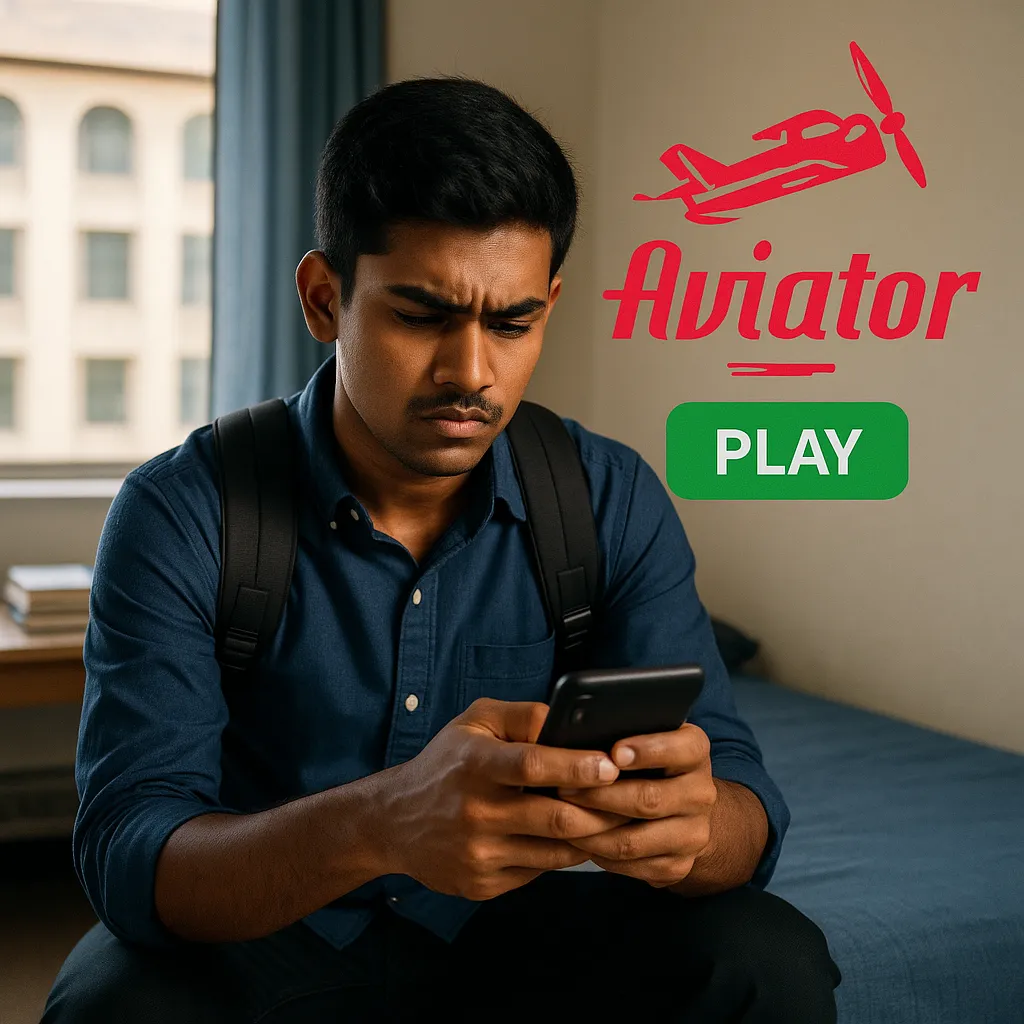Not every success story in education is about topping exams or landing scholarships. Sometimes, the most important lessons come from private choices—made in dorm rooms, hostels, or on the small screen of a smartphone. This is the story of how one college student in India discovered the fine line between play, risk, and addiction while using the Aviator game app.
The Hook of the Best Aviator Game App

Ravi, a second-year mechanical engineering student in Pune, first encountered Aviator through his classmates. For them, it was a casual pastime between lectures, no different than a quick mobile puzzle or quiz. The rules were simple enough to attract anyone:
- A plane takes off.
- The longer it flies, the higher the multiplier climbs.
- But if it crashes before you cash out—you lose everything.
At first glance, Aviator looked like a harmless way to pass time. Yet for Ravi, the Aviator bet app soon became more than a casual diversion. He realized it wasn’t just about luck; it was about timing, emotion, and judgment under pressure.
The Legal Question: Is Aviator Game Legal in India?

Before diving further, one fact cannot be ignored. India has strict laws around gambling and betting. Under the Public Gambling Act and state-level rules, many forms of real-money play—whether in casinos or online—are prohibited.
Some states differentiate between “games of skill” and “games of chance.” Aviator, depending on its version, often sits in a grey area. If money is at stake, legal risks increase. That’s why anyone using such apps must ask: is Aviator game legal in India where I live? The answer changes state by state, and the wrong assumption could lead to financial or legal trouble.
A Historical and Cultural Context of Gambling in India
While the Aviator game feels like a modern invention, the tension between chance, risk, and responsibility has deep roots in India’s cultural memory. Ancient texts already warned of the dangers of losing control in the pursuit of uncertain rewards.
In the Mahabharata, the legendary warrior Yudhishthira famously gambled away his kingdom, brothers, and even Draupadi in a fateful game of dice. This story is often retold in schools as a cautionary tale: even the wise can lose everything when desire overwhelms judgment.

Throughout Indian history, gambling has shifted between being a pastime, a royal entertainment, and a social risk. British colonial laws codified many restrictions, which later became the foundation for the Public Gambling Act. Today’s regulations echo the same principle—protecting individuals from the destructive pull of unchecked risk.
Placing Aviator India in this context shows that the challenges students face are not entirely new. The technology may be different, but the human impulse—and the need for balance—remains timeless.
What the Aviator Game Taught Ravi
Ravi did not lose thousands of rupees. He also did not walk away with big winnings. Instead, what he gained was less visible but far more valuable.
- He learned how quickly emotions cloud decisions.
- He saw his own impatience reflected in the urge to “wait just one more second.”
- He noticed how “almost winning” triggered a stronger pull than actual victories.
These realizations pushed him toward books on behavioral economics and articles on dopamine loops in game design. What began as risky play turned into a personal crash course in psychology and self-control.
The Role of Positive Thinking in Student Life
Ravi’s journey became a reminder of what schools often call education school small thoughts—daily reminders that shape long-term character. For him, the Aviator app was not about chasing cash but about discovering how self confidence, life, and positive thinking connect.

He understood that true success, whether in games or exams, comes not from chasing endless multipliers but from knowing when to pause. The same applies to relationships, job offers, or any challenge—timing matters more than compulsion.
Comparing Play, Law, and Learning
To put Ravi’s experience in context, consider three dimensions:
| Aspect | Aviator Experience | Broader Student Lesson |
| Timing | Waiting for the right cash-out moment | Knowing when to stop in studies/life |
| Risk Awareness | Fear of losing when the plane crashes | Recognizing legal and financial limits |
| Emotional Self-Control | Overconfidence leading to losses | Building resilience and patience |
This table shows why Ravi’s story is not just about a game—it’s about the wider choices students face daily.
Thought of the Day for Students
Here is a reflection Ravi shared later, one that fits well in any school assembly success thought in Hindi and English:
“Winning isn’t about the prize. It’s about knowing when to stop.”
This line works as a universal mantra. For some, it’s about cashing out before a plane crashes. For others, it’s about leaving a toxic friendship, or pausing revision to avoid burnout before exams. Clarity, not compulsion, defines true success.
Beyond the Screen: How Games Shape Student Habits
The Aviator India case is not unique. Mobile games and apps often act as mirrors of behavior. They highlight how people respond to uncertainty, stress, and reward systems. For students, this influence can shape habits that stretch far beyond the classroom.

Ravi realized that the small thrill of the Aviator bet app mirrored the same rush he felt when waiting for exam results or sending job applications. The emotional spikes were similar: nervous anticipation, overthinking, and sometimes frustration. By learning to step back and detach, he strengthened a skill that textbooks rarely teach—mental balance.
The Fine Line Between Play and Addiction
For every Ravi who gains awareness, there are many who slip into patterns of dependency. This is where positive thinking and discipline matter most. Addiction is not always about money lost; sometimes, it’s about time wasted, focus scattered, or confidence eroded.
Signs of risky play include:
- Spending more time on Aviator than planned.
- Chasing losses with “one more try.”
- Thinking constantly about the next session.
- Ignoring studies or social life to stay in the game.
Recognizing these signs early can help students make better choices before small habits turn into bigger problems.
The Role of Self-Confidence in Decision-Making
Self-confidence is often misunderstood. It’s not about believing you will always win—it’s about trusting your judgment enough to walk away. In Ravi’s case, self confidence life positive thinking meant valuing his mental clarity over a potential multiplier.
Students who learn this lesson apply it elsewhere:
- Pausing after long study sessions instead of forcing more hours.
- Walking out of peer pressure situations without fear of judgment.
- Accepting temporary failure as part of growth, not as a permanent defeat.
Confidence rooted in timing and patience becomes a foundation for success across education and career.
Is the Aviator App Just Entertainment or a Life Teacher?
Many wonder if the Aviator game should be treated only as entertainment. The truth is more layered. For some, it remains a fun distraction. For others, especially those who risk real money, it becomes a stress point.
The best aviator game app may not be one that promises winnings, but one that teaches balance. Ravi’s story shows that even a risky platform can hold lessons in self-control, provided players reflect on their actions instead of blindly chasing rewards.
Practical Tips for Students Engaging With Games Like Aviator

If students choose to try such apps, the key lies in setting boundaries:
- Treat the game as entertainment, not income.
- Never invest more than you can afford to lose.
- Check if the app is legal in your state.
- Set strict time limits—use timers if needed.
- Reflect after playing: what did the session teach you about patience, decision-making, or impulse control?
These small rules convert risk into reflection, turning potential addiction into a tool for self-growth.
Education School Small Thoughts for Daily Reflection
Schools often encourage students to share short motivational lines during assemblies. Here are examples inspired by Ravi’s experience:
- “Success is not about chasing every chance—it’s about knowing which ones to let go.”
- “In life, as in games, patience wins more than speed.”
- “A strong mind bets on clarity, not on luck.”
These thoughts blend the modern context of mobile games with timeless lessons in discipline and self-awareness, making them relatable for today’s youth.


